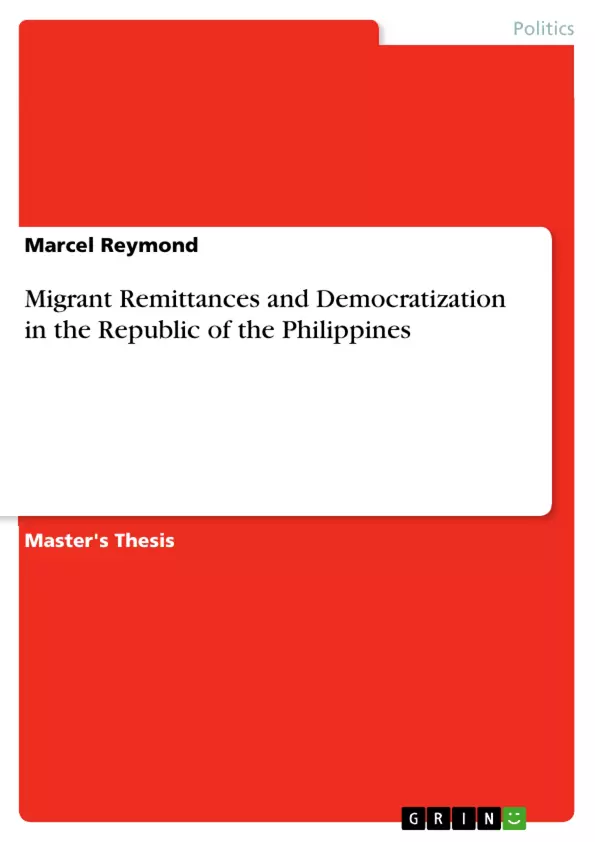This paper analyzes the remittances and democratization nexus, using the Republic of the Philippines as a case study. The onset of this paper is a riddle. A number of scholars stress the positive impact of remittances on a society and its democratization. The Philippines has successfully sought to gain more remittances through a state driven labor export scheme and has been for many years among the top receiving countries in the world. Despite those conditions deemed propitious to democratization, the Philippines show many democracy deficits. Several scholars have claimed that remittances impact positively on democratization. However, a range of democratization indicators for the Philippines, belie this assertion.
This paper delves into various aspects of the democratization, migration and remittance dynamics. Firstly, it examines the scholarly work on remittances (always understood in a wider sense, as comprising social and financial remittances) and the democratization history in the Philippines. Secondly, it argues the methodology used for this paper. Thirdly, it evaluates and describes a selected number of particularities of the Philippine democratic system and its labor export scheme. It interprets the impact of remittances on democratization in the Philippines before drawing conclusions.
TABLE OF CONTENTS
Introduction 5
Research Question and Thesis Statement 7
Objectives of the Study 7
Limitation of the Study 7
Definition of Key Terms 8
Chapter 1: Literature Review 10
Chapter 2: Research Methodology 16
Freedom in the World Index 18
Corruption Perception Index 19
Civic Society study 20
Press-Freedom Index 22
People under Threat Index 23
Chapter 3: Findings and Analysis 25
Assessment of the Philippine Democracy 25
Political system 26
Economic situation 31
GINI Index 35
The labor export scheme 36
Financial remittances 40
Civil Society 42
Press freedom 45
Peace and security 46
Social remittances 48
Summary of democratic assessment 51
Democratization impact of remittances in the Philippines 53
Conclusion and recommendations for further research 55
Bibliography 59
Inhaltsverzeichnis (Table of Contents)
- Introduction
- Research Question and Thesis Statement
- Objectives of the Study
- Limitation of the Study
- Definition of Key Terms
- Chapter 1: Literature Review
- Chapter 2: Research Methodology
- Freedom in the World Index
- Corruption Perception Index
- Civic Society study
- Press-Freedom Index
- People under Threat Index
- Chapter 3: Findings and Analysis
- Assessment of the Philippine Democracy
- Political system
- Economic situation
- GINI Index
- The labor export scheme
- Financial remittances
- Civil Society
- Press freedom
- Peace and security
- Social remittances
- Summary of democratic assessment
- Democratization impact of remittances in the Philippines
- Conclusion and recommendations for further research
Zielsetzung und Themenschwerpunkte (Objectives and Key Themes)
This paper investigates the relationship between remittances and democratization in the Philippines, using the country as a case study. The study aims to understand the impact of remittances on various aspects of Philippine democracy, including political systems, economic conditions, civil society, and press freedom. It also examines the role of the labor export scheme in facilitating remittances and its implications for democratization.
- Impact of remittances on democratization in the Philippines.
- The role of the labor export scheme in facilitating remittances.
- Analysis of the Philippine democratic system and its strengths and weaknesses.
- Examination of the relationship between remittances and various aspects of democracy, including political participation, civil liberties, and economic development.
- Evaluation of the effectiveness of remittances in promoting democratic values and institutions.
Zusammenfassung der Kapitel (Chapter Summaries)
The introduction sets the stage for the research, presenting the research question and thesis statement, outlining the study's objectives and limitations, and defining key terms. Chapter 1 delves into a comprehensive literature review, exploring existing scholarship on remittances and democratization, focusing on the Philippine context. Chapter 2 outlines the research methodology employed, including a detailed description of the data sources and indicators used to assess democratization in the Philippines. Chapter 3 presents the findings and analysis, examining the Philippine democratic system, the labor export scheme, and the impact of remittances on various aspects of democracy. This chapter also analyzes the relationship between remittances and democratization, drawing on relevant data and indicators.
Schlüsselwörter (Keywords)
The paper centers on the intersection of migration, remittances, and democratization in the Philippines. Key terms include labor export, social and financial remittances, democratization indices, civic engagement, press freedom, and the Philippine political system. The study draws on research methodologies such as the Freedom House Index, the Corruption Perception Index, and the Civic Society Index to assess the state of democracy in the Philippines.
How do remittances impact democratization in the Philippines?
The paper explores a "riddle": while some scholars suggest remittances promote democracy, the Philippines continues to show significant democratic deficits despite being a top receiving country.
What is the difference between financial and social remittances?
Financial remittances are money sent home by migrants, while social remittances refer to the ideas, values, and political beliefs that migrants transmit back to their home communities.
What role does the Philippine labor export scheme play?
The Philippine state actively manages a labor export scheme to encourage citizens to work abroad, primarily to secure a steady flow of foreign currency through remittances.
What are the main democratic deficits in the Philippines?
Challenges include high levels of corruption, threats to press freedom, and issues with peace and security, as measured by various international indices.
Can remittances stabilize a democratic system?
The study evaluates whether remittances empower civil society or if they inadvertently allow the state to bypass necessary political and economic reforms.



